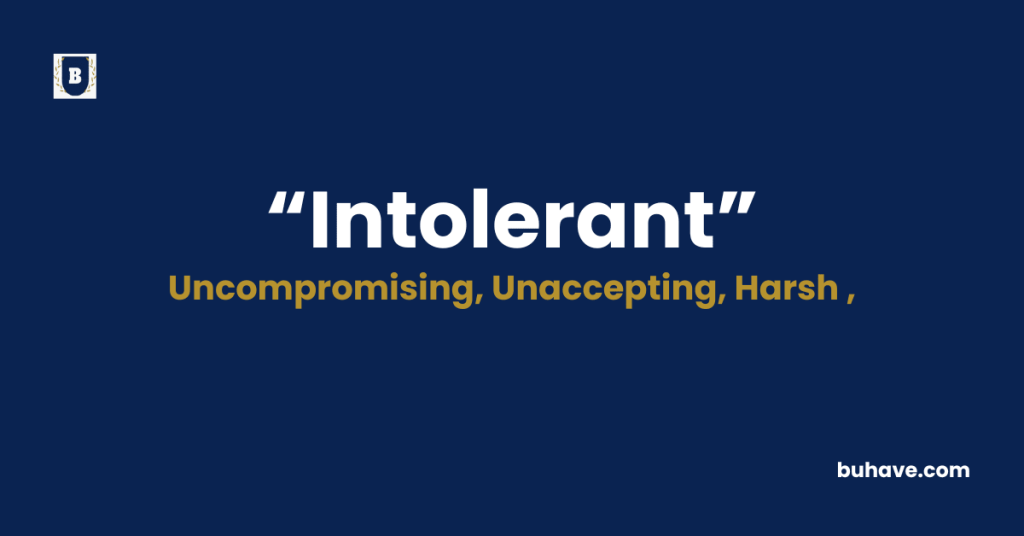The word Intolerant (adjective) refers to an unwillingness to accept views, beliefs, behaviors, or people that are different from one’s own. In this guide, you’ll learn the full definition, synonyms, antonyms, etymology, and real-life examples of how to use Intolerant correctly in sentences.
Intolerant Explained in Depth
A complete and detailed guide to the word Intolerant including meaning, definition, examples, etymology, synonyms, and antonyms.
Meanings of Intolerant
Intolerant means lacking acceptance or respect for differences, whether in opinion, culture, identity, or lifestyle. It typically suggests rigidity, narrow-mindedness, or prejudice.
Definition
Intolerant refers to someone or something that refuses to acknowledge or accept opposing views, diversity, or differing values. It can describe individuals who are quick to judge or condemn others, especially in social, political, or religious contexts. Often, intolerance results in exclusion, discrimination, or conflict. For example, a person who refuses to work with someone of a different background may be considered intolerant. The term can also apply to physical sensitivities, such as food intolerance, but in a social context, it highlights an attitude of closed-mindedness. It is the opposite of open-mindedness and acceptance and is frequently challenged in efforts to promote equity, dialogue, and inclusion.
While some use the term to justify strong beliefs, true intolerance ignores others’ rights and perspectives.
Etymology
The word “intolerant” originates from the Latin word intolerans, meaning “not enduring” or “unable to bear.” It combines the prefix in- (not) with tolerare (to bear, to endure). The English form entered the language in the early 17th century and quickly became associated with social and religious conflict. Over time, its usage broadened to encompass any lack of acceptance or refusal to recognize difference. Historically, the term described authoritarian systems, biased ideologies, or rigid moral codes. In modern usage, it often signals behavior or attitudes that go against inclusivity or equity.
Today, it’s a key term in civil rights discussions, workplace diversity training, and educational frameworks aimed at fostering mutual respect.
Example Sentences
- He was known to be intolerant of criticism, even from close friends.
- An intolerant society often fails to embrace diversity and progress.
- The organization promotes dialogue over intolerant behavior or speech.
Intolerant Synonyms
- Prejudiced
- Bigoted
- Narrow-minded
- Biased
- Close-minded
- Unyielding
- Dogmatic
- Fanatical
- Discriminatory
- Rigid
Intolerant Antonyms
- Tolerant
- Open-minded
- Accepting
- Inclusive
- Fair
- Understanding
- Empathetic
- Respectful
- Neutral
- Broad-minded
FAQs about Intolerant
Here’s a FAQ-style guide about the word “Intolerant”
1. What does it mean to be intolerant?
It means rejecting or being unwilling to accept different views, lifestyles, or identities.
2. Is intolerance always harmful?
Often yes. It can lead to discrimination, conflict, or exclusion of others.
3. Can someone be intolerant without realizing it?
Yes. Unconscious biases or cultural norms can lead to intolerant behavior without intent.
4. How is intolerance different from having strong opinions?
Strong opinions respect others’ rights, but intolerance shuts down dialogue and acceptance.
5. What are signs of an intolerant person?
They may dismiss differing views, avoid diversity, or react negatively to change or difference.

















